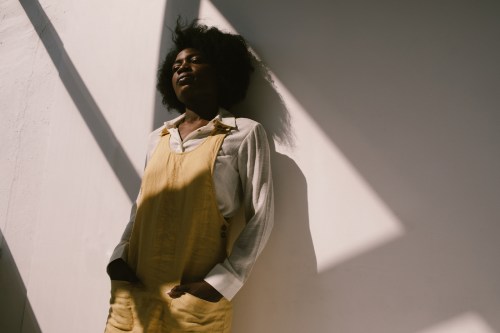We’re in a New Age of Black Grief
Finding ways to cope through systemic turmoil is ever important right now, especially for Black people. Here's why we're in a new age of Black grief.

My first reactions when the realities of the pandemic set in mid March was not to flounder or panic. Instead, I settled into the familiarity of what it means to grieve—something I’d already been doing for the past three years at the hand of a dear friend dying far too soon. Grief is many things I’ve learned—disbelief with nowhere else to go, writhing in anger because of no satisfying answers for what feels unfathomable, confronting the void that losses leave behind.
The grief of what it means to be Black in this country founded on white supremacist ideals and being a witness to mass Black death, compounded due to a highly contagious virus we still don’t fully understand and state violence at the hands of police, is beyond what many of us could’ve expected to weather in our lifetime.
Ajita M. Robinson, LCPC, of Friends in Transition Counseling in the D.C. area specializes in grief, loss, and trauma counseling. She has seen a marked increase in Black clients seeking counseling services because of the triggers of what continues to unfold.
“[COVID-19] slowed life down in a way that forced us to sit with ourselves and our lived experience—not only individually but collectively,” Robinson says. “For all of this to happen in the midst of the pandemic, it felt like the last straw for many people who were holding onto some level of normality or hope about the state of our world and the state of existence as Black people in this country.”
Black people in America have always grieved. Whether it was due to the loss of home when dragged from their native lands to be forcefully placed into chattel slavery; the tearing away from their families and the communities they’d built. It was there in the loss of personhood, independence, and freedom.
The brutalities and grief became a part of our psyche and that trauma, and the pains were passed down from generation to generation as a warring inheritance. The uptick in visceral traumas is one of growing concern for Robinson, both for her clients and Black people in general.
“I’m concerned about the increases in complex and vicarious trauma that we experience as Black people in general that is being amplified during this pandemic,” says Robinson. “We are a community-based people. One of the ways we collectively mourn and grieve is by being in community, whether that be in a family or friend’s home. We do those things, honoring and mourning rituals, together. And that is something we have lost in this pandemic and in the uprising.”
We have always grieved and yet, this grief, this heaviness—akin to shouldering the weight of the world—is uncharted for those within my generation and the generations to come.
In many ways, it is a new age of grief as we tussle with old injustices, some with new faces. With newness comes new rules. New ways of coping and striving to survive. New ways of finding the light, or joy, in order to keep trudging forward.
In many ways, it is a new age of grief as we tussle with old injustices, some with new faces. With newness comes new rules. New ways of coping and striving to survive. New ways of finding the light, or joy, in order to keep trudging forward.
Tatianna Morales—who is affectionately known as Tatianna Tarot on Instagram—routinely shares tarot card pulls with her audience along with spiritual guidance. Since March, she’s been sharing with her followers (most of whom are Black and brown) how to ground themselves despite the chaos of current life. One thing she has been steadily encouraging along with self-care—proper sleep, drinking enough water, regular spiritual cleansing baths—is ancestor veneration.
“Tapping into one’s ancestry or simply learning about ancestral veneration can also do wonders,” says Morales. “Your guides and honorable ancestors will work to provide you with the right tools and wisdom to get by and thrive—as long as you are diligent at implementing the medicine given.”
Robinson recommends those struggling first take stock of what they might need—whether it be professional help, a support group, less social media usage and news watching.
“In the face of trauma comes grief,” says Robinson. “And grief is a full body experience. Trauma is as well. Think about the ways that you are physically, emotionally, psychologically, spiritually compromised and what support you need.”










